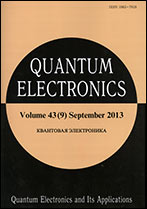|
Compensation of nonlinear distortions of optical radiation
Yu. N. Karamzin, A. P. Sukhorukov, V. A. Trofimov
Abstract:
A study is made of the operation of an adaptive self-focusing system with additional conditions on the wavefront distribution formed by the system. An aberration-free description of the propagation of optical radiation is used to analyze the operating regimes of adaptive systems in the case of discrete and continuous control algorithms. The results obtained using an approximate model are confirmed by numerical experiments carried out on the basis of quasioptic equations.
Received: 06.05.1983
Citation:
Yu. N. Karamzin, A. P. Sukhorukov, V. A. Trofimov, “Compensation of nonlinear distortions of optical radiation”, Kvantovaya Elektronika, 11:4 (1984), 693–700 [Sov J Quantum Electron, 14:4 (1984), 470–474]
Linking options:
https://www.mathnet.ru/eng/qe5009 https://www.mathnet.ru/eng/qe/v11/i4/p693
|


| Statistics & downloads: |
| Abstract page: | 224 | | Full-text PDF : | 101 | | First page: | 1 |
|





 Contact us:
Contact us: Terms of Use
Terms of Use
 Registration to the website
Registration to the website Logotypes
Logotypes









